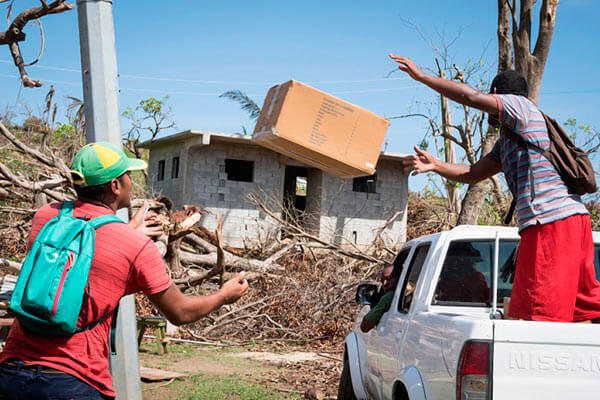Seven weeks since hurricane Maria made landfall in Dominica and left widespread destruction in its wake, the United Nations migration agency say it has been supporting local tradespeople with safe construction skills to repair the damage and create conditions for a full recovery.
The UN said on Tuesday that one of the first beneficiaries to have her house repaired by local construction workers trained by the UN International Organization for Migration (IOM) is 31-year-old Tessa Williams, a mother of three, whose eldest child is in a wheelchair and youngest still an infant.
“With this house, we have ensured that Tessa and her children have a safe home,” said Jan-Willem Wegdam, IOM’s team leader in Dominica. “The community sees there is actually something happening and we have completed the training of our carpenters on safe construction skills,” he added.
Tessa was chosen by her own community to be one of the first recipients of the IOM support, the UN said.
According to the IOM, 20 teams of trained local workforce are repairing the roofs of some 400 vulnerable households, which were moderately to heavily damaged in the storm. They are deployed in Wesley, Calibishi and Woodford Hill, three of the hardest-hit communities on the Caribbean island, the IOM said.
Furthermore, with funding from the UN Central Emergency Response Fund and the government of the United Kingdom, IOM said it procured building materials in the Dominican Republic in record time and brought it to Dominica with the help of the Dutch Navy.
The UN said rebuilding houses is also helping address some of the tensions in the community resulting from prolonged stay in makeshift dwellings or living in close coexistence with relatives or friends.
The work is also having another impact: it is keeping many people from migrating to neighboring countries in search of better opportunities after losing their homes and means of livelihood in the aftermath of the hurricane, the UN said.
“Housing projects are a great way to keep locals from leaving the island, but we need stronger funding to create as many employment opportunities as possible and to rebuild the lost dwellings,” said Wegdam, adding, “It’s not only about having a roof over their heads but about creating the conditions for a full recovery after a huge disaster.”
The UN said Dominica was hit on Sept. 18 by the Category Five Hurricane Maria that devastated the island, with winds of nearly 250 km per hour.
It has been estimated that 23 percent of buildings were destroyed, 39 percent of the houses sustained severe damage, and further 28 per cent were affected to some degree, the UN said.
However, it said sustained support is needed on the island “as almost 2,000 persons — including the elderly, single-female heads of households and persons with chronic diseases – are still living in shelters due to destruction or severe damage to their homes.”


























